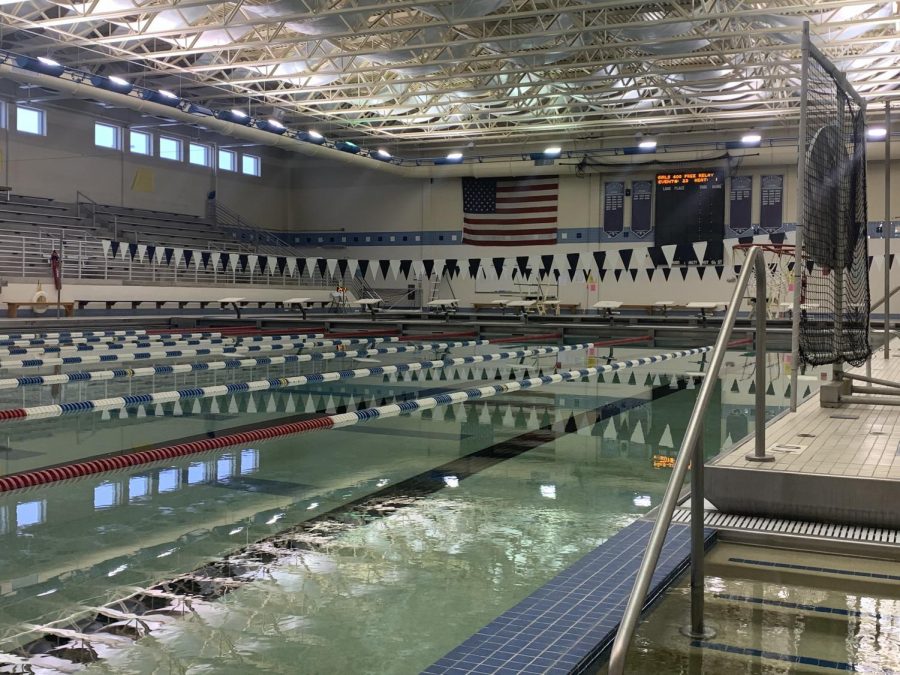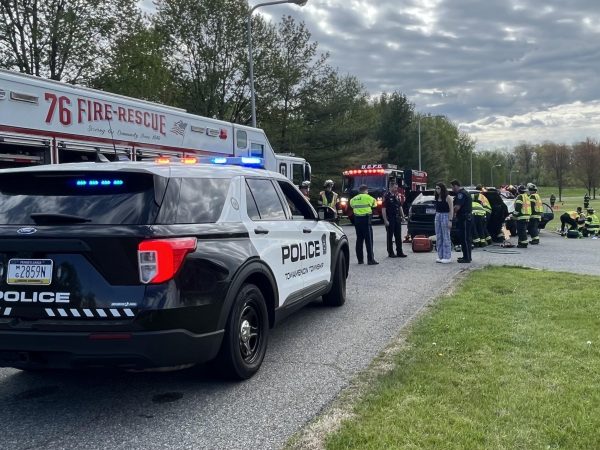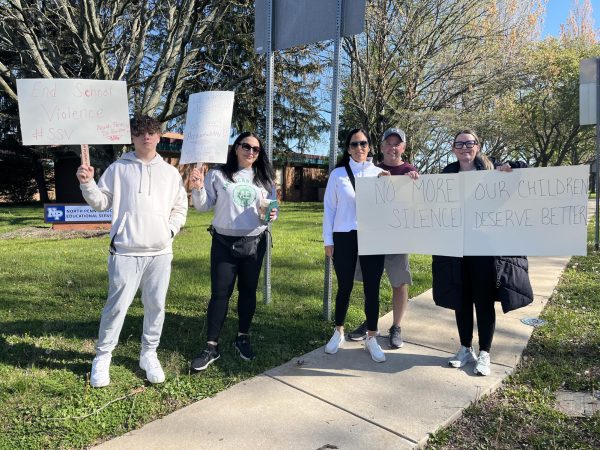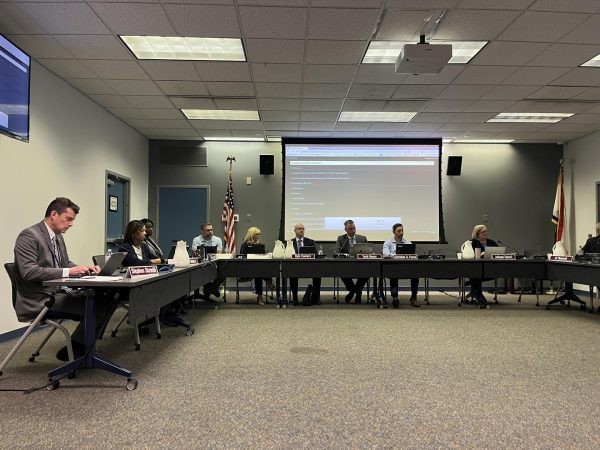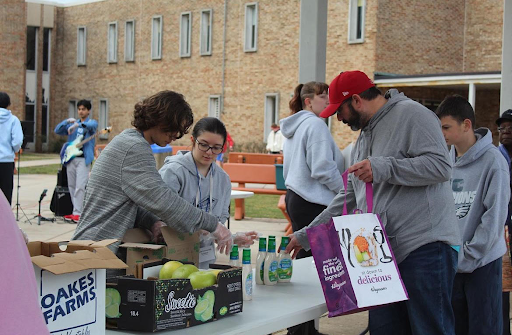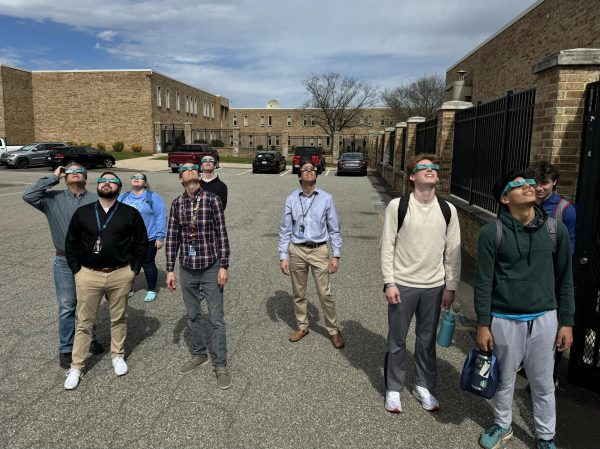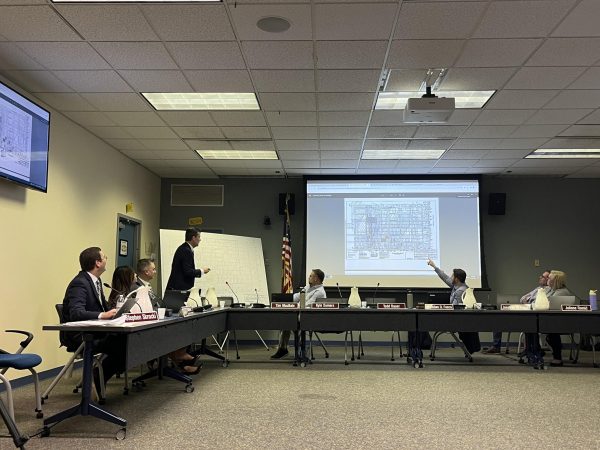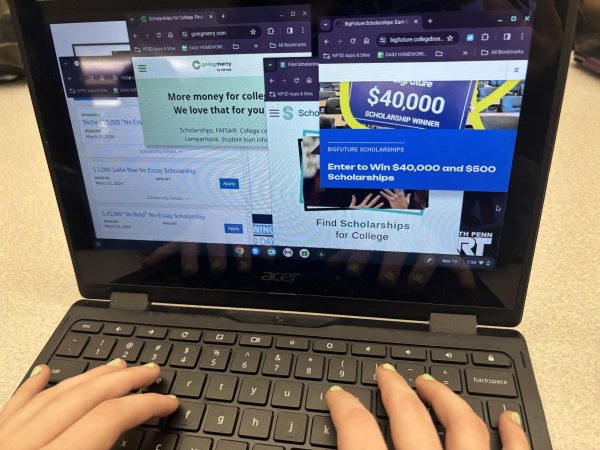Teachers, Board conflict over 9-0 decision to reduce PE requirement, make Aquatics optional
In two separate interviews following Thursday’s action meeting, The Knight Crier spoke to Mr. Dave Franek, Chair of the NPHS Health and PE Department, Board President Tina Stoll, and Board Director Dr. Elisha Gee.
After the vote at the February 18th action meeting, incoming sophomores will soon have a choice when it comes to their PE class.
LANSDALE- At its February action meeting last Thursday, the North Penn School Board unanimously voted to change graduation requirements and reduce the required amount of PE classes from four years to three and to make the previously required Aquatics course optional. Several North Penn High School Health/Physical Education teachers voiced their opposition to the approval of this change at the start of the meeting, and reaffirmed their sentiments during the second Audience of Citizens, after the votes had been cast.
Currently, all North Penn students take a PE class in 9th, 10th, 11th, and 12th grades. The Aquatics course is a 10th grade requirement. With this change, students are still able to take PE all four of those years, but only three years are required, and Aquatics is no longer mandated.
“What it means for the PE department, and, more importantly, our students, is that the overall PE credit will be reduced. Instead of having to take PE in 9th, 10th, 11th, and 12th grade, they now only have to take it in 3 of the 4 years. That could be taking it in 9th, 10th, and 11th, it could be 10th, 11th, and 12th, or any combination of that,” NPHS PE Department Chair Dave Franek explained.
The overall required number of credits for graduation have not changed, but, beginning in the 2022-23 school year, students will have the opportunity to take an additional .3 credit minor course that can, but does not have to be, a PE class.
“Kids still need that .3 credit to graduate, but after [Thursday’s] Board meeting, unfortunately, it does not have to be in physical education. However, it can be. The hope is that we are attractive enough and we have families who understand and believe taking physical education for all 4 years is important. We could still have a kid doing what every kid graduating this year will have done,” Franek said.
“We have a strong, charismatic, bright, great idea people in the high school. People have already started kicking around a lot of ideas and we are definitely up for the task. There’s going to be some work to be done probably between now and through the end of the summer, when we have to have something in the cue ready to go for approval from the Board in the Program of Studies that would occur usually in the fall of 2021, that will affect the 22-23 school year. I don’t think we are going to have a lack of ideas or offerings. I feel like it’s going to be more of what can we all agree upon that we can make flow,” he continued.
We have a strong, charismatic, bright, great idea people in the high school. People have already started kicking around a lot of ideas and we are definitely up for the task.
— Dave Franek, NPHS PE Department Chair
This process began around the start of the current school year, when Assistant Superintendent Dr. Todd Bauer was tasked with working with the NPHS PE staff to see what flexibility could be made in the schedule to allow this change to occur.
“We kind of said to [Dr. Bauer] ‘we need to find room in the schedule so that we can offer more electives and more opportunities for student choice.’ They went around and around the scheduling part, because that’s not a data thing; you have to look at the schedule and figure out how do things move, what are the different ways in which we can do this. They brought it to the ECI committee and said ‘this is the way in which you can do it’ in North Penn, where you have 1,000 students in a graduating class,” Board Director Dr. Elisha Gee explained.
Members of the Board also hope that the PE department can be ‘attractive enough’ and, between now and late summer/early fall, is able to come up with a handful of new electives that students will want to take.
I know that our Phys Ed department is full of wonderful teachers and will rise to that challenge.
— Tina Stoll, NPSD Board President
“What we are doing is asking the Phys-Ed department to come up with classes that students will want to take. Things that are related to mental health, making the class about yoga or mindfulness or whatever. Coming up with alternate aquatics classes. Besides just swimming, maybe different water sports; I think kayaking was thrown out there as a suggestion. But, again, challenging the PE department to come up with PE aquatic courses that kids will want to take. I know that our Phys Ed department is full of wonderful teachers and will rise to that challenge,” Board President Tina Stoll said.
“For the summer, what it will mean for the department is, under the leadership of the Department Chair, we’re hoping that the PE teachers are really going to gather around the idea of looking for opportunities for innovative ways to support student wellness. I’m hoping that out of that, as an educator myself, we all see the impact of social emotional well-being of our students, so looking for opportunities for additional courses that could be offered that might be aligned with, say, mindfulness, or mediation, or yoga,” Gee added.
Franek shared his frustration when hearing ideas like incorporating yoga into the PE curriculum, because it is already a unit in 11th grade Life Fitness.
They’re not going to be able to know everything that goes on in every class. They can’t possibly know everything, and I don’t blame them for that. When I correct them over and over that those are things we do already, I do get a little offended by that.
— Dave Franek
“That’s so disheartening…we do yoga. Our 11th and 12th grade, we do that. That’s another irritating factor to me. They’re not going to be able to know everything that goes on in every class. They can’t possibly know everything, and I don’t blame them for that. When I correct them over and over that those are things we do already, I do get a little offended by that,” Franek said.
The Board’s rationale behind this decision is that it continues their ongoing work to improving opportunities for college and career readiness for all North Penn students.
“We have talked about college and career readiness publicly as part of our Comprehensive Goals probably since the very beginning. We’ve always talked about how is that going to happen? How can we look for more opportunity for choice? Prior to the December ECI meeting [when this potential change was first discussed publicly…watch the meeting here], of course, there’s always information that has to be gathered, and we wanted to make sure that our PE department was able to hear some of the info. Dr. Bauer did meet with PE teachers to talk about what this could look like, they looked at the graduation requirements. As you know, it’s pretty tight. The December meeting was a compilation of the information that they had gathered. They had given us a lot of information, we had spoken to people and everything, even before December, but publicly, they have to present the information to us and we need to have the conversations,” Gee explained.
One of the biggest frustrations felt by the PE department is the amount of data collection that was behind this decision. Over the past year, the Board has based all of their COVID-19 and school reopening decisions based on metrics and data, and the NPSD Covid Dashboard has provided information about the number of positive cases in each school.
“That was one of the more upsetting parts of this whole thing. There wasn’t too much data collection. It was very anecdotal and very opinion-based. I do believe that families should have choice, that decisions should be made as a family. But I also think that, sometimes, there should be a controlled uncomfortability of having to do something. With the safety net of parents or grandparents or teachers…I’ve used the example that my son doesn’t want to go to his well visit because he might not like his shot, but I know better. As much as he might kick and scream, this has to happen so that he’s safe. It’s sometimes uncomfortable, but we need some uncomfortability in our life,” Franek expressed.
Franek, along with several other PE teachers, values very highly the current Aquatics program, established by former teacher and coach Rich Carroll, when the current NPHS building opened in 1971. But to them it’s not just about the history of the program, but rather its relevance and necessity in today’s world as well. Cutting the aquatics requirement as part of this restructuring adds to their frustration.
“It should not be just because students don’t want to be inconvenienced by taking a course such as aquatics; that’s not a valid reason. That’s very anecdotal. I do worry about the can of worms this could open up with other subject areas. I feel like the district has always prided itself on rigor and relevance. The relevance is undisputed, but the rigor has gotten so lessened, particularly during the pandemic,” Franek continued.
The PE department complied data from over a dozen sources to support their argument against the Board’s decision.
The guidelines of the National Physical Activity Report Card (NPARC) recommends 60 minutes of activity a day, which, when multiplied by 180 school days over 4 years, adds up to 43,200 minutes. The current NPHS requirement is 40 minutes of activity for 60 school days a year for 4 years, which adds up to 9,600 minutes, just 22% of the NPARC’s recommendations. The new requirement will decrease the amount of minutes to 7,200, or just 16%.
Additionally, the 2019 PA High School Youth Risk Behavior Survey shows ‘lack of physical activity and participation in sports disproportionately impacts students of color versus their white classmates,’ which was cited during the action meeting’s Audience of Citizens by NPHS teacher Katie Kelley. Kelley argued that data like this would show this change will work against the Board’s ongoing effort to promote equity throughout North Penn.
“I think the District has done a great job of reflecting society and trying to be more equitable with a lot of things. I firmly, completely disagree [with this] and to me, only the have-nots will suffer from this. It’s going to benefit the kids that ‘have.’ If you have transportation, you can come in late. If you have means and are financially able to, you can take a community college class for credit,” Franek continued.
Gee countered this idea by explaining how this decision can, in fact, lead to more equity for North Penn’s students; it will allow opportunities for a student who may already know how to swim to use that period to take an alternate course that will teach them another skill.
The word equity means giving students what they need, not trying to give everyone the same thing. That’s the opposite of equity. Giving everyone the same thing is equality. We’re looking for equity.
— Elisha Gee, NPSD Board Director
“The word equity means giving students what they need, not trying to give everyone the same thing. That’s the opposite of equity. Giving everyone the same thing is equality. We’re looking for equity. Giving children what they need, and there are a lot of children who do need that life skill, and those families can sit with a guidance counselor [as a part of the course selection process]. You can get from here to there and determine if this is the skill that you need, or perhaps you already have that skill, and you need a different skill,” Gee said.
“The decisions that are being made from an equity standpoint are all about the students and their families being able to have choice. It leads very much to college and career readiness. That really is the story here…the domino effect of this one change is that we will be able to open up some time; we’d love to open up more time, somehow, but this is just what we can do for now,” Gee added.
The Board cited data used to back this graduation requirement collected from their partnership with Hanover Research in which, over the past 3 years, the district has collected information about school climate and cultural proficiency, among other topics, from a number of forms, surveys, etc.
“3 years ago, we contacted with Hanover Research. We’ve done safety forms, forms around cultural proficiency, we’ve had surveys, etc…and in those surveys, we’ve been able to collect a lot of information about what is important to our school community. In those, in community conversations…all of that is a collection of data. That is informative for us. We knew in looking at college and career readiness that many students are not coming out of high school really knowing what they want to do, what they want to major in, and yet their parents are having to invest in $40,000 or more. That’s data you can pull from a number of different sources. That was a piece of us prioritizing college and career readiness from the very beginning,” Gee explained.
“There have certainly been multiple meetings with stakeholders; was it on the topic of PE and health? No. It was on the broad topic centered around our comprehensive goals. All of that data collection that our administrators are doing every day…this wasn’t an outcry from someone that said ‘change this!’ This was us looking at our system, which is what we’ve been doing from the very beginning. We do it in facilities, in education, in looking at how our system serves kids; how is it student-driven and how do we create opportunities for student engagement,” Gee continued.
Stoll and Gee do not discredit the data cited by the PE department, but rather argue that this is just another way to incorporate the invaluable aspect of student choice.
“Dr. Gee and I are both parents of athletes, so we both value physical education. All of those studies that they pulled are true. Physical education and well-being is so important to a healthy lifestyle. We totally agree with that. We haven’t taken the opportunity for PE away. You can still take that PE course if you want to that fourth year, it’s just not required. We do know the importance of physical education. We also feel that it’s very important to have those student choices available for college readiness. We also want to encourage the trades, and we are big on promoting vo-tech school. There are all different avenues that our students can take; we’re all about promoting as many choices as we possibly can. This is [us being] pro-choice,” Stoll noted.
We do know the importance of physical education. We also feel that it’s very important to have those student choices available for college readiness.
— Tina Stoll, NPSD Board President
“I don’t think we’re disputing any of their data [in terms of claiming] it’s not really important…they’re just very passionate, as well they should be, as well we want them to be. I’m excited about what will be presented to us in the fall to come out of this. I think there could be students looking at these electives like ‘oh, such and such would be really neat!’ I’m telling you that I have taken up mindfulness and meditation during COVID, and it has been a great way to deal with stress and anxiety. Listen, there’s a lot of data out there that shows that it works for students as well,” Gee added.
In the years to come, the Board is looking to create even more opportunities with internships, dual enrollment, and Montgomery County Community College to further equip students with choice and access to college and career readiness tools.
“You have more seniors coming out of school with college credit, so that they can go into college with a certain number of credits. Wouldn’t it be great if you could come out with 12 credits? Your English 101, your psychology…that’s where we’re headed.The fact is, my own daughter, who graduated last year, she went into college with 15 credits; not because of North Penn, but because we went to Montco and had her take classes. That’s the kind of innovative approach that we as a district want to pursue,” Gee said.
“I graduated early from Penn State, because I went into college with 18 credits already. In today’s dollars, you figure a semester at Penn State with room and board and tuition is $20,000. Student college debt is a big deal these days, and there’s talk all the time about forgiving college debt, but wouldn’t it be great if we could help kids not have that debt in the first place? It benefited me, so I would really like to see it benefit other students if we can make that happen,” Stoll added.
When it comes to student choice, Franek believes that there is still plenty of room in the schedule to work with Montco and internships, and does not think this PE requirement change is necessary to allow flexibility to continue.
“It’s great that kids are going to have that opportunity to maybe start their college career with a leg up. I’ve been around long enough to know that not everybody can afford that. Even at the community college rate…I think that we allow kids enough choice. I think there’s a reason why we have certain things as a requirement and certain things as a choice. That’s part of my argument. There’s still plenty of room to accomplish a lot of what they want to do with internships and college credit and keeping early release/late arrival/study halls. It’s there. It’s built into the schedule. It’s ready to go. I think this is going to create more of a snowball problem. I do respect families and their ability to talk amongst each other and have choice and do what’s best for them, but in the same token, I don’t believe there was much outcry against this,” Franek explained.
I think that we allow kids enough choice. I think there’s a reason why we have certain things as a requirement and certain things as a choice. That’s part of my argument. There’s still plenty of room to accomplish a lot of what they want to do with internships and college credit and keeping early release/late arrival/study halls. It’s there. It’s built into the schedule.
— Dave Franek, NPHS PE Department Chair
“There’s dueling data points; there’s plenty of studies that show that kids who have the dual enrollment, for instance, do better in college. They already have so much invested into it,” Stoll said.
Another question that arises from the Board’s decision is, if, potentially, less students enroll in aquatics, therefore decreasing the number of classes where the pool is being used, if the multi-million dollar natatorium will still be living up to its fullest potential.
“Our pool is $7 million. There’s an operating cost to that. I don’t think that’s too fiscally responsible to have that wonderful facility…and NP is a $300 million dollar operation. It’s one of the richest communities in the state because of our vast resources for the community…we would give our kids all the benefits of a wonderful public school education that only a kid who’s on the swim team or polo team would benefit from. We firmly believe that every kid should leave North Penn being water-safe,” Franek said.
“We have that wonderful, beautiful facility, and the opportunity for free public education to get that crucial life skill is right there at their fingertips. I do think that would be some fiscal irresponsibility. I would question the efficiency of the things that we have. My hope is that kids and families will realize that it is important. If this turns out to be a disaster, I’m hoping that we can try and get the toothpaste back in the tube and reevaluate our focus to make sure…this shouldn’t be something we don’t do just because it’s during the school day. That’s not a valid argument,” Franek continued.
If this turns out to be a disaster, I’m hoping that we can try and get the toothpaste back in the tube and reevaluate our focus to make sure…this shouldn’t be something we don’t do just because it’s during the school day. That’s not a valid argument.
— Dave Franek, PE Department Chair
Stoll and Gee do not see this as a likely occurrence, and discussed the possibility of even forming a relationship between NPSD elementary students and the NPHS aquatics instructors.
“PE and aquatics will still be offered. Every child in the district can learn to swim. They absolutely can if they want to. Tina and I have talked about what to us makes a lot of sense is…let’s look at where there might be opportunities, maybe during the summer, to offer swim classes to younger students. You should be learning to swim in like 2nd grade,” Gee noted.
“My kids learned to swim in preschool at the YMCA, and to me, there is a big gap between preschool and 10th grade. Logistically not possible during the school year…but maybe there is some way we can focus on the younger children, since it is a life skill, they should learn it earlier, not waiting until 10th grade. I would also say that, being a parent of kids that played sports, the kids that start off young are the ones that stick with it. So if we gave opportunities to the younger kids to be able to swim earlier, maybe we could get more people interested in being on the swim team, or playing water polo, or any of the water sports that we offer. I just think it’s more of a choice for everybody, all the grade levels. We’ll certainly be using our facilities that we have; it’s not going to go to waste. People will be using it still. People will have their choice. The bottom line is the more choices, the more flexibility, that’s what we were looking to do, and I think that’s what we’re going to achieve,” Stoll added.
We’ll certainly be using our facilities that we have; it’s not going to go to waste. People will be using it still. People will have their choice. The bottom line is the more choices, the more flexibility, that’s what we were looking to do, and I think that’s what we’re going to achieve.
— Tina Stoll, NPSD Board President
Besides the issue of the natatorium’s use potentially being unfulfilled, Franek sees other ramifications that could result from this vote.
“My thought is that it’s my job as a teacher and a parent…is to expose students to things, to put them in come calculated uncomfortable situations. Now, we’re just lessening that opportunity and rigor. Particularly, kids of color, kids who come from diverse backgrounds…the statistics are very clear…It’s a life skill. No question. I think all kids should leave North Penn being water-safe, and we have the ability to do that,” Franek noted.
“To be honest, I think it was reckless to stigmatize certain populations as people who you assume wouldn’t want to take swimming. I think it’s reckless to do that and give people an out. You don’t know until you try it, and I think we’re going to create an atmosphere where we have kids that are less water-safe and less healthy,” Franek continued.
As the PE department and Board move forward with changing the curriculum and adding crafting new courses, disagreements still linger.
“If we had taken swimming away as a choice, I could see ramifications. This is a choice for every single family to be able to make. No one can say ‘I wasn’t able to take swimming my sophomore year.’ In fact, if you think about it, you’re probably more flexible, because you can take it any year. They can take it now in 11th grade or 12th grade if they would want, so I don’t really see that,” Gee said.
“This is not about PE. Overall, this is how we’re approaching the way in which we want to govern,” Gee explained. “We want there to be a sense of student choice…and we believe in our teachers and the passion that these departments have. We respect them for that. I am sure it’s going to be fantastic. I really do believe that.”


